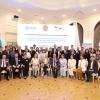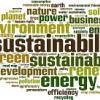Search
Displaying Results 101 - 125 of 150
Since their independence, countries in Eastern Europe and the South Caucasus (EESC) – Armenia, Azerbaijan, Belarus, Georgia, the Republic of Moldova and Ukraine – have introduced far-reaching reforms to boost innovation and benefit from the potential of the growing knowledge-based economy.
A new project, bringing together three UN statistical offices, is helping countries to produce and use new statistics to measure the connections between gender and trade.Trade in goods and services is the engine of economic activity, and measuring this trade has for a long time been a
What steps have been taken and what still needs to be done to improve environmental conditions, deliver inclusive economic growth and ensure resilience to climate change? What progress has been made in achieving public participation in decision-making and the reform of education systems towards
Trade facilitation has key importance for improving the governance of the economy of Ukraine – a country with a population of 45 million people at the borders of the European Union and the Eurasian Economic Union, still facing important political, economic and social governance issues. In order
Creating favourable regulatory frameworks and incentives for renewable energy development, diversifying energy supplies, tackling greenhouse gas emissions from the energy sector and ensuring the safety of oil and gas pipelines are just some of the energy-related issues addressed in UNECE
Sustainable forest management indicators developed through a participatory process can provide important information on forest resources and support evidence-based forest policies. The concept of criteria and indicators, integrating social, economic and ecological aspects, was developed
Much progress has been made since the 1990s in the countries of Eastern Europe, the Caucasus and Central Asia (EECCA - Armenia, Azerbaijan, Belarus, Georgia, Moldova, Kazakhstan, the Kyrgyz Republic, Tajikistan, Turkmenistan, Ukraine and Uzbekistan) to address severe environmental problems while
Responding to the request of the Governing Council of the United Nations Special Programme for the Economies of Central Asia (SPECA), UNECE is building the capacity of public and private experts in the SPECA participating States to use the semantic standards and reference data models of the UN
Each UN country team develops with the host Government a strategic plan to support national development priorities and strategies. The result is the UN Sustainable Development Cooperation Framework (UNSDCF). The preparation of the UNSDCF begins with a Common Country Analysis (CCA), which provides
The importance of statistical information to help us cope with disasters has never been clearer than over the past year. As the Covid-19 pandemic has gripped the world, numbers have become our bread and butter. Yet the pandemic has also highlighted the challenges and imperfections in many systems;
A circular economy is a paradigm which can contribute to reducing the economic, environmental and social costs of resource use, while at the same time strengthening economic competitiveness, reducing poverty, and providing better quality of life, in line with the United Nations 2030 Agenda for
Over the past few years, Tajikistan has strengthened its efforts to boost its economy and improve its competitiveness in global markets. As a result of wide-ranging regulatory and economic reforms, the country has succeeded in improving its ranking in the Trading Across Borders Index, from
Major industrial accidents can have far-reaching, transboundary and long-term impacts on populations and the environment. Without adequate coordination between land-use planning and industrial safety communities to ensure, for example, appropriate land use zoning and safety distances, the
The Fourth Industrial Revolution: reshaping innovation policies for sustainable and inclusive growth
Whereas economic growth is recognized as the most important instrument for the decline in global poverty levels in the past 50 years, not all countries have been equally successful at reducing poverty, and income inequality has risen considerably within and among countries. Moreover, current
Armenian forests are among the most threatened ecosystems, with degradation accelerating, largely attributable to deforestation and overexploitation. Thus, “expansion of forests is one of the main goals for Armenia, not only for the forests’ protective role, but also to develop forest-related
The economic and sanitary crisis caused by the pandemic calls for new ways of doing business. We need to digitalize data and document exchange in cross-border transport and supply chains to avoid person-to-person contacts, while increasing the efficiency of trade and transport operations. However,
Four thousand kilometers away from the UNECE headquarters in Geneva used to lie the Aral Sea. It was the fourth biggest lake in the world, in fact the lake was bigger than Switzerland. But if we travelled there today, we would only find a desert as the lake has dried out. The Caucasus and
Discussions at the recent 33rd annual session of UNECE’s Working Party on Regulatory Cooperation and Standardization Policies (WP.6) focused on how to target continued compliance of products with embedded artificial intelligence, reflecting the importance and the challenge that such products can
UNECE and partners have started implementation of a multi-year project on “Improving the energy efficiency of the global building supply chain industry and its products to deliver high performance buildings” (full project budget EUR 19.8 million), funded by the International Climate Initiative (IKI
As Ministers from across the UNECE region gather in the Cypriot capital of Nicosia to outline new initiatives to work towards a sustainable and ecological future at the 9th Environment for Europe Conference (5-7 October), the final report on the Batumi Action for Cleaner Air (BACA), adopted 6 years
The residential sector is one of the major consumers of energy in many countries. In Armenia, for example, it accounts for 33% of total energy use. Rising fuel prices will bring substantial affordability challenges for low-income customers to heat their homes. According to UNECE research, at least
The new UNECE Guide on producing CPI under lockdown, published today, helps national statistical offices to produce the Consumer Price index (CPI) under periods of lockdown and other emergencies.
The Consumer Price Index, or CPI, is a key economic indicator in most countries, giving a
Energy efficiency and renewable energy are two of the three pillars of Sustainable Development Goal 7 Ensure access to affordable, reliable, sustainable and modern energy for all. Progress in achieving the targets of SDG7 on energy efficiency and renewable energy is still insufficient in many
How can improved environmental performance promote economic growth while ensuring environmental protection and sustainable management of natural resources, supporting countries’ progress in achieving the Sustainable Development Goals (SDGs)?These are among the key objectives of UNECE
Strategic Environmental Assessments (SEA) can be instrumental in the transition towards the green economy. This was the key message delivered by three European environment ministers, UNECE, the European Commission, the Netherlands Commission on Environmental Assessment and civil society












